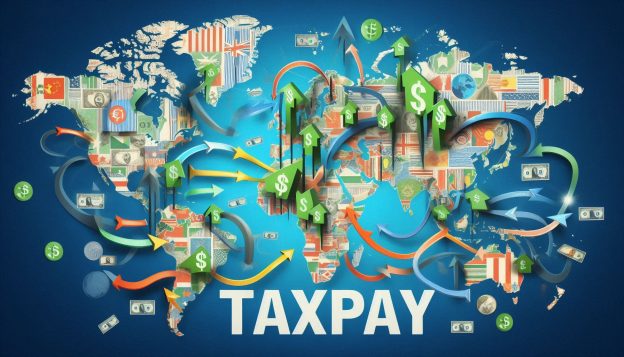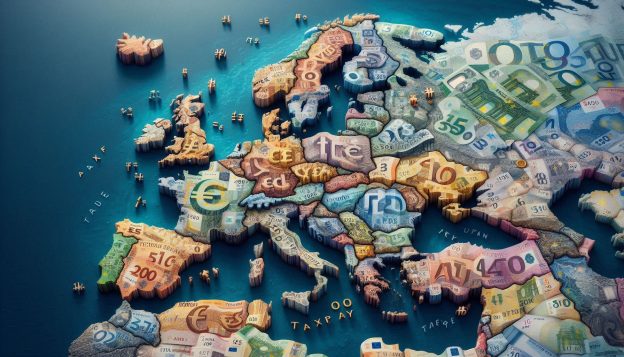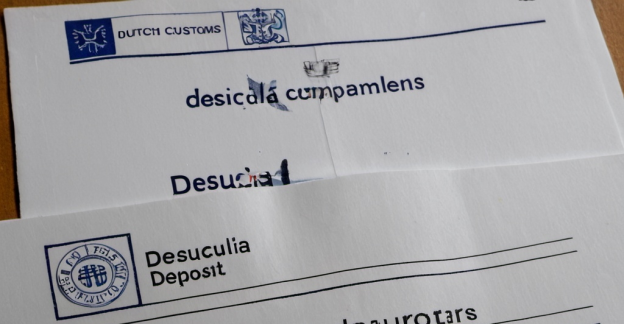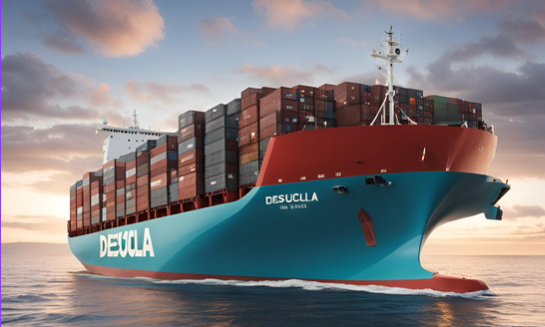Digital Taxes Around the World: Navigating a Complex Landscape

Digital taxation has become a central issue for governments as the global economy shifts increasingly online. With digital giants generating significant revenue from markets without a physical presence, countries have sought new ways to ensure fair taxation. However, the implementation of these taxes varies widely across jurisdictions, presenting challenges for multinational companies. Here’s a look at how digital taxes differ globally and how solutions like the Desucla TaxPay service can simplify compliance.
What Are Digital Taxes?
Digital taxes generally target revenues generated by large multinational companies from digital services, such as online advertising, user data, or platform services. These taxes aim to ensure that these companies pay a fair share of tax in the countries where they operate digitally, even if they lack a physical presence there.
Key Examples of Digital Taxation Globally
- – European Union: The EU has been at the forefront of digital taxation. Several EU countries have implemented a Digital Services Tax (DST), targeting large tech companies like Google, Facebook, and Amazon. For example, France imposes a 3% tax on digital companies generating revenue from digital advertising and user data in the country. Similarly, Italy has implemented a DST that charges 3% on certain digital revenues generated in its market, impacting large multinational tech companies?
- – United Kingdom: The UK has introduced a 2% Digital Services Tax, targeting digital services revenues such as social media platforms, search engines, and online marketplaces. This tax is applicable to companies that generate over £500 million globally, with at least £25 million from UK users.
- – United States: The U.S. has yet to adopt a nationwide digital tax, but many states impose sales taxes on digital goods and services. The federal government has also expressed concerns over unilateral digital taxes implemented by its trade partners, seeing them as discriminatory against American companies.
- – India: India has implemented a 2% Equalisation Levy on e-commerce operators earning revenue from digital services or sales to Indian customers, even if they do not have a physical presence in the country. This levy targets companies that offer online sales, advertising services, or content streaming to Indian users.
- – Latin America: Mexico and Brazil have introduced VAT-like digital taxes on services provided by digital platforms to their residents. These taxes are generally applied to digital sales, streaming services, and other online transactions, with compliance enforced through local fiscal representatives or intermediaries.
Challenges with Digital Tax Compliance
Navigating these varying rules and rates presents a challenge for multinational companies. Differences in thresholds, rates, and the scope of taxable services can make compliance complex, leading to potential risks of underpayment or overpayment. Moreover, the need for local representatives in many markets adds another layer of complexity.
How Desucla TaxPay Can Help
Desucla TaxPay simplifies the settlement of international digital tax obligations, providing companies with an efficient, streamlined approach to last mile compliance:
- – Single Centralised Overview: Desucla TaxPay helps businesses bring together treasury and tax professionals by providing a single holistic, cross jurisdiction, cross sub-entity, cross taxes view. This aids with cashflow forecasting, reduces the burden between responsibility hand off and ensures a consistent view from both the Tax and Treasury teams.
- – Local Fiscal Representation: For markets that require local fiscal representatives, such as the certain EU jurisdictions, Desucla can manage these relationships, helping companies maintain compliance without the need to establish a physical presence. This service is particularly useful in countries like France, Italy, and India, where local intermediaries can play a crucial role.
- – Consolidated Payment Solutions: Managing payments to different tax authorities can be cumbersome. Desucla TaxPay consolidates these transactions, allowing businesses to make a single payment, which Desucla then distributes to the relevant tax authorities. This simplifies record-keeping and eases the administrative burden.
- – Comprehensive Reporting: Transparency in reporting is essential to avoid penalties. Desucla TaxPay generates detailed reports for each jurisdiction, ensuring that businesses can provide accurate documentation during audits or inquiries from tax authorities.
The Bottom Line
As countries continue to refine and expand their digital tax frameworks, staying compliant is more important—and more complex—than ever. Desucla TaxPay offers a reliable solution for businesses navigating the patchwork of digital tax rules across the globe, making it easier to meet obligations and focus on growth. Whether you’re dealing with digital services taxes in the EU, equalization levies in India, or local VATs in Latin America, Desucla’s comprehensive service ensures you’re covered.
Let Desucla handle your digital tax payments, so you can focus on what you do best—growing your business. ?
Understanding Different Types of Technology for Settling Tax Liabilities, Including Desucla’s TaxPay Solution

In today’s digital age, businesses face evolving complexities when it comes to managing their tax obligations. As companies grow and expand their global footprint, managing tax compliance efficiently and settling tax liabilities in different jurisdictions can become a significant challenge. Fortunately, technology offers various solutions that simplify this process, allowing businesses to focus more on their growth while maintaining compliance. This article explores the different types of technologies and mechanisms organizations can leverage to settle tax liabilities, with a special focus on Desucla’s TaxPay solution.
1. Digital Payment Portals and E-Filing Systems
One of the most common ways businesses settle their tax liabilities is through government-provided digital payment portals. Many tax authorities now provide online platforms where businesses can file their returns and make payments directly. These portals offer a streamlined way to submit tax information, calculate liabilities, and process payments, reducing paperwork and eliminating the need for physical visits to tax offices.
– Benefits:
1. Direct integration with tax authorities.
2. Real-time confirmation of payments.
3. Automated calculations based on filings.
4. Enhanced transparency and record-keeping.
– Examples: Many countries have their own e-filing systems, such as the IRS e-file system in the U.S., HMRC’s online services in the UK, and the EU’s OSS (One-Stop Shop) for VAT.
While these platforms are widely adopted, they often vary in usability and support, particularly when dealing with cross-border transactions. For global businesses, additional tools may be needed to navigate different tax regimes and streamline the process (including the need to have a local individual to access the platform). Desucla TaxPay supports payments to these tax authorities.
2. Enterprise Resource Planning (ERP) Systems
ERP systems, like SAP, Oracle, and Microsoft Dynamics, offer comprehensive financial management modules that include tax calculation and payment capabilities. For large enterprises, integrating tax management into their existing ERP systems can help ensure that all financial data is consistent and compliant across multiple jurisdictions.
– Benefits:
1. Centralized financial management.
2. Automatic calculation of taxes based on location, product, and customer details.
3. Customizable reporting and analytics for better visibility into tax liabilities.
4. Integration with other business functions, such as accounting and procurement.
However, implementing ERP-based tax management can be costly and time-consuming, especially for smaller businesses or those without in-house expertise in configuring these systems. They often lack the integration to specialist tax payment knowledge required to orchestrate successful tax payments. Desucla TaxPay supports payment of liabilities processed by all ERP platforms.
3. Third-Party Tax Automation Software
For businesses seeking more flexibility and ease of integration, third-party tax automation software can be a game-changer. Solutions like Avalara, Vertex, and Thomson Reuters ONESOURCE provide tax calculation and reporting tools that integrate with existing accounting and e-commerce platforms. These tools are especially useful for handling sales tax, VAT, and other indirect taxes across multiple regions.
– Benefits:
– Automated tax calculation for e-commerce transactions.
– Real-time tax rate updates based on changing regulations.
– Streamlined compliance processes for various jurisdictions.
– API integrations with e-commerce and ERP platforms.
These platforms are particularly helpful for businesses operating in multiple regions with differing tax rates and rules. They automate complex tax calculations and ensure that businesses remain compliant without the need for deep in-house tax expertise. Whilst they support in the compliance activity they require a disparate payment mechanism to complete the process. Desucla TaxPay supports onward payment of Tax Liabilities identified by Third-Party Tax Automation Software.
4. Representation Services
For businesses that trade in a foreign market that requires representation, representation services play a crucial role in managing customs & tax liabilities. A fiscal representative acts on behalf of the business to ensure that taxes are paid correctly, often simplifying the process for companies that are new to a particular market.
– Benefits:
– Simplifies the process of registration and compliance.
– Reduces the risk of penalties due to incorrect filings.
– Offers expertise in local regulations and requirements.
Desucla specializes in this space, providing services that help businesses enter those markets requiring representation, without the complexities of direct VAT registration. This allows companies to meet their obligations efficiently and with minimal administrative burden settle their tax liabilities (utilising Desucla TaxPay to settle all tax liabilities seamlessly).
5. Desucla’s TaxPay Solution: A Comprehensive Approach
Desucla’s TaxPay solution is a unique offering that combines the ease of digital payment with the expertise of representation and tax payment, providing businesses with a seamless way to manage and settle their tax liabilities, regardless of the tax authority, tax type or complexity of assuring accurate reconciliation.
What is TaxPay? TaxPay is a streamlined digital payment solution that allows businesses to settle VAT, Digital Services Taxes, Customs Duties and in fact any non-individual taxes in a straightforward manner. Desucla’s solution is designed to handle the complexities of orchestrating international tax payments, making it ideal for companies that want to complete their compliance processes.
Key Features of Desucla’s TaxPay Solution:
– Integrated Payment Gateway: TaxPay allows businesses to pay their tax obligations through a secure, user-friendly digital portal, ensuring that all obligations are met without delay.
– Automated Compliance: The solution includes automated checks and calculations, ensuring that all payments align with the latest regulatory requirements.
– Representation: Desucla’s experience and network of local expertise is embedded into the platform to ensure payments are requested, received & allocated correctly every time.
– Cross-Border Expertise: Desucla’s team of tax payment experts coupled with our banking partners provides guidance on the nuances of international tax payments, helping businesses navigate compliance in settling tax liabilities internationally.
Why Choose Desucla’s TaxPay? TaxPay is particularly beneficial for businesses that are looking to expand their operations internationally but want to avoid the complexities of settling tax. By leveraging TaxPay, companies can focus on scaling their operations while knowing their tax liabilities are handled efficiently, accurately and matching their existing treasury processes.
Conclusion: Choosing the Right Solution for Your Business
Managing tax liabilities is a crucial aspect of running a business, and the right technology can make this process smoother and more efficient. While digital payment portals, ERP systems, and third-party software all offer their own advantages, a comprehensive solution like Desucla’s TaxPay can provide additional value, especially for businesses expanding into new regions, optimising internal processes or looking to reduce fines & penalties for non-compliance.
With Desucla’s TaxPay, you get the advantage of a secure payment system combined with expert guidance and support. This means less time spent ensuring payments are allocated correctly and more time focusing on what matters most—growing your business.
Ready to simplify your tax payments? Reach out to Desucla today to learn more about how our TaxPay solution can help you manage your tax liabilities with ease.
Understanding Payment Methods and Corporate and other Tax Types in the United States

In the United States, corporate and business taxes vary significantly from state to state, making it essential for businesses to understand the tax landscape in each region they operate. Beyond federal taxes, companies must navigate various state-level taxes, including corporate income tax, real estate taxes, sales taxes, and others. Payment methods for these taxes can differ as well, adding another layer of complexity for businesses.
This article explores the different types of business taxation and the payment methods businesses must be aware of when operating in the U.S. It scratches the surface of the complexity of managing not only compliance in the US but ensuring that any liabilities are discharged appropriately.
Key Tax Types in the U.S.
1. Corporate Income Tax
The U.S. federal government imposes a standard corporate income tax, but each state has its own set of corporate income tax rates and rules. While some states have a flat rate, others have graduated rates based on income levels. A few states, such as Wyoming, South Dakota, and Nevada, do not impose a corporate income tax at all.
-
- Example: California has a corporate income tax rate of 8.84%, whereas Texas does not have a corporate income tax but instead imposes a franchise tax based on the company’s revenue.
2. Sales Taxes
Sales taxes are imposed on the sale of goods and services. Businesses must collect and remit sales tax to the state on behalf of their customers. Sales tax rates vary from state to state and may also include local sales taxes, making the effective rate higher in some areas.
-
- Example: In New York, the base state sales tax is 4%, but local jurisdictions can add up to an additional 4.875%, leading to a total sales tax rate as high as 8.875% in some regions.
3. Real Estate Taxes
Real estate or property taxes are levied on property owned by corporations, including buildings, land, and other real estate holdings. These taxes vary greatly depending on the location and the value of the real estate. These often include payments to fire & police departments along with local district payments – each demanding their own payments via set payment methods.
-
- Example: In Illinois, the effective real estate tax rate is around 2.16%, making it one of the highest in the country, whereas Hawaii has a much lower effective real estate tax rate of 0.28%.
4. Franchise Taxes
Some states, such as Texas and Delaware, impose a franchise tax, which is a tax for the privilege of doing business in the state. This tax is often based on the company’s net worth or revenue rather than its income.
-
- Example: Texas has a franchise tax of 0.75% on companies with annual revenues above $1,230,000, while Delaware charges a franchise tax based on the number of authorized shares a corporation has.
5. Gross Receipts Taxes
Instead of, or in addition to, corporate income tax, some states impose a gross receipts tax, which is levied on a company’s total revenue without deductions for costs or expenses. This can be particularly burdensome for companies with high revenues but slim profit margins.
-
- Example: Ohio has a Commercial Activity Tax (CAT), which is a gross receipts tax of 0.26% on revenue over $1 million.
6. Payroll Taxes
Payroll taxes are not a state tax per se, but businesses in all states must withhold federal payroll taxes for Social Security, Medicare, and unemployment insurance. Additionally, states impose their own unemployment taxes and, in some cases, temporary disability insurance or paid family leave taxes.
-
- Example: New York requires businesses to contribute to the state unemployment insurance fund, and in states like California, employers must also pay into the State Disability Insurance (SDI) program.
Other State-Specific Corporate Taxes
- Excise Taxes: These taxes are typically levied on specific goods such as fuel, alcohol, and tobacco. Businesses that manufacture or sell these products must account for excise taxes in their financial planning.
-
- Example: Massachusetts imposes a fuel excise tax of $0.24 per gallon, which businesses in the energy sector must pay.
- Use Taxes: Similar to sales taxes, use taxes are imposed on goods purchased outside the state but used within the state. If a business purchases equipment or supplies from a state without sales tax, it may still be liable for use tax in its home state.
-
- Example: If a company based in California buys equipment from Oregon (a state without sales tax), it must pay California’s use tax upon bringing the equipment into the state.
-
Tax Payment Methods
Different states offer various methods for paying taxes, including online payments, wire transfers, and mailing checks. Here’s an overview of common payment methods:
1. Online Payment Portals: Most states provide an online payment portal where businesses can file and pay their taxes. These portals allow for convenient and quick tax submissions, ensuring compliance deadlines are met.
-
- Example: California’s Franchise Tax Board allows businesses to make online payments for income, franchise, and sales taxes.
2. Electronic Funds Transfer (EFT): Some states require businesses to use EFT for payments over a certain threshold. EFT is typically mandatory for larger companies due to the volume and size of their payments.
-
-
- Example: In Texas, if a company’s franchise tax liability exceeds $10,000, it must use EFT for payments.
-
3. Mailing Payments: While less common, some businesses still prefer mailing checks to state tax authorities, and in some cases a check is the only accepted form of payment (e,g. for real estate related taxes in certain states). However, this method can take longer to process, and there’s a risk of missing payment deadlines.
-
- Example: Florida’s Department of Revenue accepts mailed payments for corporate income tax and sales tax.
4. Wire Transfers: Large corporations often use wire transfers for immediate payment, especially when making substantial payments for real estate or other high-value taxes.
-
- Example: Businesses in New York can use wire transfers for real estate tax payments if the payment exceeds a certain threshold.
Conclusion
Navigating the tax landscape in the United States requires a deep understanding of the various types of taxes that apply at both the federal and state levels.
From corporate income taxes and sales taxes to real estate and payroll taxes, each state has its own set of rules and rates, and understanding these is key to maintaining compliance and optimizing your tax strategy.
With flexible payment methods available in most states, businesses can manage their tax obligations efficiently, ensuring timely payments while maximizing cash flow.
By understanding these taxes and leveraging state-specific options like franchise or gross receipts taxes, businesses can better plan their operations and reduce financial burdens.
Whether operating in multiple states or planning a single-state expansion, being informed about corporate taxes is essential to successful business growth in the U.S.
Desucla TaxPay
Desucla TaxPay supports payment across a wide range of payment methods for US Domestic and International payments. Our services complement your existing compliance arrangements (whether internal, using cloud software or a compliance provider) to provide visibility of upcoming, paid and importantly reconciled tax payments. Align with your internal treasury processes to batch payments into single payment runs, alleviate Treasury beneficiary management risk and reduce the timescales to process payments.
TaxPay Series. Making International Tax Payments Easy – France, Italy, Spain & Romania

Our first article in our TaxPay series, explaining some of the challenges in making international tax payments and solutions to those challenges.
Payment Methods for Settling Taxes in EU Countries: France, Italy, Spain, and Romania
Paying taxes in different EU countries requires businesses to navigate various national procedures, systems, and payment methods. Each country has its own specific guidelines for how taxes, including VAT (Value Added Tax), corporate income tax, and other levies, must be settled. Below is a look at the different payment methods for settling taxes in France, Italy, Spain, and Romania. These are just some of the countries our clients have had recent trouble settling their Tax Liabilities.
Desucla TaxPay enables businesses to settle all tax liabilities across the globe without the need for local bank accounts, knowledge of specific payment processing or dealing with their banks FX rates. Choose to settle in a single currency (for example settling in USD to a US based account) for onward payment in local currency via the correct method as required for that tax type and country.
France
– Bank Transfer (Virement Bancaire): The most common method for tax payment in France is via bank transfer. French businesses can make tax payments directly from their bank account to the French Treasury using a unique tax reference number. Cross-border businesses must use a French bank account to ensure smooth processing.
– Direct Debit (Prélèvement Automatique): For regular taxes like VAT or corporate tax, businesses can set up a direct debit authorization with the tax authorities. This ensures that tax payments are automatically deducted from the business’s bank account when due.
– Online Payment Portal (Télépaiement): France offers an online portal where businesses can make tax payments. The portal, part of the “Impots.gouv” platform, allows businesses to submit payments electronically.
– Payment by Card: French authorities also allow tax payments via credit or debit card, primarily for smaller amounts or individuals, but businesses can use this method for certain types of taxes.
– Desucla TaxPay: A single solution for Treasury and Tax professionals to manage tax payments. Settle in your local currency, lock in a single beneficiary and utilise our dedicated Tax Payments routes for each tax type & country.
Italy
– F24 Payment Form: In Italy, most taxes, including VAT and corporate income tax, are paid using the F24 form. Businesses fill out the form, specifying the amount and type of tax to be paid. Payments can be made through online banking, the post office, or directly at a bank.
– Online Banking (Home Banking): Italian businesses frequently use home banking platforms to process tax payments. Once the F24 form is completed, payment can be settled via the company’s online bank account.
– Electronic Payment Through Revenue Agency Portal: The Italian Revenue Agency offers an electronic system where local businesses can file and pay taxes online. This portal is integrated with Italy’s Sistema di Interscambio (SdI) for e-invoicing, making it convenient for companies to manage their tax obligations digitally.
– Direct Debit: Large companies often set up direct debit arrangements with their banks and the Italian tax authorities to streamline the process for recurring payments, such as VAT. A local bank account is required.
– Desucla TaxPay: A single solution for Treasury and Tax professionals to manage tax payments. Near instant onward payment available for example funds received in your TaxPay USD account release FX trades and onward payments to Tax Authorities – reducing the time for funds to be received by the Tax Authority (and reducing any risk of penalties and fines).
Spain
– Bank Transfer (Transferencia Bancaria): Tax payments in Spain are commonly made through bank transfers. Businesses are required to use an authorized Spanish bank account to transfer the payment to the tax authorities, ensuring that the tax reference number is included in the payment.
– Direct Debit (Domiciliación Bancaria): Businesses can authorize Spanish tax authorities to withdraw taxes directly from their bank accounts. This is often used for regular VAT filings or corporate tax payments, ensuring timely payment and avoiding penalties for late filing. A local bank account is required.
– Online Payment (Pago Telemático): The Spanish Tax Agency (Agencia Tributaria) provides an online payment system where businesses can file returns and settle taxes. The portal accepts payments via electronic banking or cards linked to a Spanish bank.
– Payment Through Banks: For smaller businesses, payments can be made in person at a Spanish bank branch. Banks process these payments on behalf of the tax authorities, but this method is becoming less common due to digitalization efforts.
– Desucla TaxPay: A single solution for Treasury and Tax professionals to manage tax payments. Configurable workflow for approval between Tax and Treasury teams, locked beneficiaries to approved Tax Authorities (or tax agents) removing fraud risks and complete payment oversight.
Romania
– Bank Transfer: Bank transfer is the primary method for paying taxes in Romania. Businesses are required to transfer tax payments to specific accounts designated by the Romanian tax authorities, depending on the type of tax being settled. For correct allocation to your account a local bank account is required to be used.
– Online Payment Portal (Ghiseul.ro): Romania has made significant strides in offering an online portal for tax payments. Through Ghiseul.ro, businesses and individuals can settle their tax liabilities using bank cards. This portal is part of Romania’s broader e-governance initiative to simplify administrative processes.
– Post Office or Treasury Office Payments: Romanian businesses can also settle taxes in person at the post office or through designated treasury offices, although this method is used less frequently due to the convenience of online systems.
– Payment through Treasury’s POS Terminals: At local treasury offices, businesses and individuals can use POS terminals to make payments using debit or credit cards, offering a flexible option for immediate settlement.
– Desucla TaxPay: A single solution for Treasury and Tax professionals to manage tax payments. A cross entity, cross tax type and cross-country platform to provide visibility of future, current and completed payments. Documentation stored for each stage including payment demand, payment requests (for Treasury teams), payment proof and tax authority confirmation of receipt & allocation.
Common Trends and Challenges
– Preference for Digital Payments: Across the EU, including in France, Italy, Spain, and Romania, there is a clear trend toward digitalization of tax payments. Online portals and bank transfers are the primary methods, driven by efficiency and the desire to reduce administrative errors. Often these require specific sequencing in relation to the return (before/after the submission) to avoid penalties and return of funds (often months later).
– Country-Specific Bank Accounts: In most countries, foreign businesses must maintain local bank accounts to settle taxes. This can complicate cross-border operations, as businesses need to navigate different banking regulations and requirements. Often referencing for correct allocation of funds is required and cannot be supported by cross border international payments (i.e. a payment from your local bank).
– Administrative Costs and Language Barriers: In some countries, including Spain and Romania, tax payment procedures can be cumbersome for foreign companies. Navigating online systems in the local language, alongside complex payment processes, often requires assistance from local tax professionals.
Tax and Treasury teams have sufficient challenges just keeping upto date with changes to each countries tax demands especially given the pace of new taxes, changes to existing and new schemes being rolled out. Desucla TaxPay removes the payment burden from Treasury and Tax teams, facilitating payments inline with company payment runs, reduces risk of errors and offers dedicated tax payment methods across the globe.
Desucla TaxPay
Contact us today for more information about how Desucla TaxPay can help your organisation:
– easily grow into new markets,
– reduce the risk of tax payment fines,
– reduce your operational costs and
– complement your existing Treasury & Tax software (simple on-boarding & adoption)
Your Trusted Indirect Representative for EU Customs Imports

Understanding Indirect Representation in EU Customs
When importing goods into the European Union (EU), businesses have two primary options for customs representation: direct and indirect. Understanding the difference between these two can significantly impact the efficiency, compliance, and liability of your import operations.
What is Indirect Representation?
Indirect representation involves appointing a third party, like Desucla, to act on behalf of the importer in all customs-related matters. As an Indirect Representative, we not only handle the paperwork and compliance but also share the legal responsibility for the customs procedures with the importer. This is distinct from direct representation, where the customs agent acts solely in the name of the importer, who retains full responsibility for all customs-related obligations.
Advantages of Choosing Indirect Representation with Desucla
- Shared Liability and Compliance Assurance
- With Desucla as your Indirect Representative, we share the legal liability for customs compliance. This partnership ensures that both parties are fully invested in adhering to all regulatory requirements, reducing the risk of penalties and delays.
- Expertise and Local Knowledge
- Navigating the complexities of EU customs regulations can be challenging. Our team of experts stays up-to-date with the latest laws, tariffs, and procedures, ensuring your goods clear customs smoothly and efficiently.
- Streamlined Operations
- By handling all customs-related tasks on your behalf, Desucla allows you to focus on your core business activities. Our efficient processes minimize the risk of delays, ensuring your goods reach their destination on time.
- Enhanced Flexibility
- Indirect representation offers greater flexibility, especially for non-EU businesses. You can rely on Desucla to act as your representative without the need to establish a permanent presence within the EU, making it easier to access the European market.
- Risk Mitigation
- In the event of a customs dispute or error, the shared responsibility in indirect representation means that Desucla will work closely with you to resolve the issue, providing an added layer of protection for your business.
Why Choose Desucla?
At Desucla, we understand the critical role that customs clearance plays in your supply chain. Our commitment to accuracy, efficiency, and compliance makes us the ideal partner for your customs needs. By choosing Desucla as your Indirect Representative, you are not just appointing a service provider—you are gaining a partner dedicated to your success in the EU market.
Let Desucla handle the complexities of EU customs, so you can focus on growing your business. Contact us today to learn more about our services and how we can support your import operations into the European Union.
Understanding the Deposit Requirement for Importing Goods into the EU

Understanding the Deposit Requirement for Importing Goods into the EU from the Netherlands and How to Avoid It
When importing goods into the European Union (EU) through the Netherlands, businesses often encounter various financial and regulatory requirements. One significant aspect is the deposit that may be required by Dutch customs authorities. This deposit is intended to cover potential VAT (Value Added Tax) liabilities on imported goods, ensuring that the importer complies with EU tax obligations. However, this deposit can tie up a substantial amount of capital. Fortunately, using an Importer of Record (IOR) or a Limited Fiscal Representative (LFR) can help businesses avoid this financial burden.
What is the Deposit Requirement?
The deposit requirement is a financial guarantee that Dutch customs authorities may request from importers when goods are brought into the EU through the Netherlands. This deposit serves as a safeguard to ensure that VAT will be paid on the goods being imported. The amount of the deposit is typically based on the value of the goods and the applicable VAT rate, which can be a significant sum, especially for high-value shipments.
This deposit is essentially a temporary payment held by the customs authorities until the goods are cleared, and all VAT obligations are fulfilled. For many businesses, especially those dealing with large volumes of goods, this requirement can create cash flow challenges and limit the availability of working capital.
How to Avoid the Deposit: Using an Importer of Record (IOR) or Limited Fiscal Representative (LFR)
To avoid the need for a deposit when importing goods into the EU through the Netherlands, businesses can leverage the services of an Importer of Record (IOR) or a Limited Fiscal Representative (LFR). Both options provide viable solutions for managing VAT obligations without the need to tie up capital in a deposit.
Importer of Record (IOR)
An Importer of Record (IOR) is a third-party entity that takes on the responsibility of importing goods into the EU on behalf of the actual importer. The IOR assumes all legal responsibilities, including the payment of VAT and compliance with customs regulations. By using an IOR, the original importer can avoid the deposit requirement since the IOR handles all VAT obligations.
Advantages of Using an IOR:
– No Deposit Required: The IOR handles VAT payments, eliminating the need for the importer to provide a deposit to Dutch customs.
– Simplified Process: The IOR manages all customs and tax-related paperwork, ensuring compliance with EU regulations.
– Risk Mitigation: The IOR assumes legal liability for the import, reducing the risk for the original importer.
Limited Fiscal Representative (LFR)
A Limited Fiscal Representative (LFR) is another option available to non-EU businesses importing goods into the EU via the Netherlands. The LFR is authorized by Dutch customs to act on behalf of the importer for VAT purposes. By appointing an LFR, the importer can defer VAT payments, which means that the VAT on imported goods is accounted for and reported, but payment is postponed until the goods are sold within the EU.
Advantages of Using an LFR:
– VAT Deferment: The LFR allows for the deferment of VAT payments, avoiding the upfront deposit required by customs.
– Improved Cash Flow: By deferring VAT, businesses can maintain better cash flow and allocate capital to other operational needs.
– Tax Compliance: The LFR ensures that all VAT-related obligations are met in accordance with Dutch and EU tax regulations.
Which Option is Right for Your Business?
Choosing between an IOR and an LFR depends on your business’s specific needs and circumstances. If you want to fully outsource the import process, including all legal responsibilities and VAT payments, using an Importer of Record like Desucla may be the best option. On the other hand, if you prefer to maintain more control over your operations while deferring VAT payments, appointing a Limited Fiscal Representative could be more suitable.
Why Choose Desucla?
At Desucla, we offer both Importer of Record and Limited Fiscal Representation services, tailored to meet the unique needs of your business. Our team of experts is well-versed in Dutch and EU customs regulations, ensuring that your goods are imported efficiently and compliantly. By partnering with Desucla, you can avoid the deposit requirement, streamline your import operations, and focus on growing your business in the European market.
Contact us today to learn more about how Desucla can help you navigate the complexities of importing goods into the EU through the Netherlands and how our services can save you time, money, and hassle.
Your Trusted Importer of Record and Indirect Representative for EU Imports

Desucla: Your Trusted Importer of Record (IOR) and Indirect Representative for EU Imports
When importing goods into the European Union (EU), ensuring compliance with complex customs regulations and legal obligations is crucial for smooth and successful operations. One of the key roles in this process is the Importer of Record (IOR). Desucla offers specialized services as an IOR and Indirect Representative, providing a seamless solution for businesses looking to navigate the challenges of importing into the EU.
What is an Importer of Record (IOR)?
The Importer of Record (IOR) is the entity responsible for ensuring that imported goods comply with all relevant laws and regulations in the destination country. This includes filing the necessary customs declarations, paying import duties and taxes, and ensuring that all documentation is accurate and complete. The IOR is legally responsible for the goods during the import process, making this role essential for compliance and risk management.
How Desucla Can Act as Your IOR
As your Importer of Record, Desucla takes on the full responsibility of managing your import operations into the EU. Our team of experts handles every aspect of the import process, from compliance and documentation to payment of duties and taxes. By acting as your IOR, we ensure that your goods are imported legally and efficiently, minimizing risks and delays.
Desucla as an Indirect Representative
In addition to acting as your IOR, Desucla also offers services as an Indirect Representative. This means we not only manage your imports but also share the legal responsibility for customs compliance. Our dual role as IOR and Indirect Representative provides a comprehensive solution that simplifies your import process and ensures full compliance with EU regulations.
Top 5 Advantages of Using an Importer of Record (IOR)
1. Compliance and Risk Mitigation
Importing goods into the EU involves navigating a complex web of regulations, standards, and requirements. As your IOR, Desucla ensures that all necessary compliance measures are met, significantly reducing the risk of legal issues, fines, or delays. Our deep understanding of EU regulations allows us to handle even the most complex import scenarios with ease.
2. Simplified Customs Procedures
Managing customs declarations, tariffs, and documentation can be overwhelming for businesses unfamiliar with EU customs procedures. Desucla’s expertise as an IOR simplifies this process by taking on the responsibility of all customs-related tasks. This includes preparing and submitting accurate documentation, ensuring proper classification of goods, and managing the payment of duties and taxes.
3. Streamlined Import Operations
By acting as your IOR, Desucla streamlines your entire import operation. We handle all the details, allowing you to focus on your core business activities. Our efficient processes ensure that your goods move through customs quickly and without unnecessary delays, helping you maintain a reliable supply chain.
4. Cost Savings
Partnering with Desucla as your IOR can lead to significant cost savings. Our expertise in customs and trade compliance helps avoid costly errors, fines, and delays. Additionally, by outsourcing the IOR function to Desucla, you can reduce the need for in-house resources dedicated to managing imports, leading to lower operational costs.
5. Market Access Without Physical Presence
For businesses outside the EU, establishing a physical presence in the region can be expensive and time-consuming. As your IOR, Desucla provides you with access to the EU market without the need to set up a local entity. This allows you to expand your business into the EU quickly and efficiently, leveraging our local knowledge and expertise.
Why Choose Desucla as Your Importer of Record?
Desucla is committed to providing comprehensive, reliable, and efficient import services. As your Importer of Record and Indirect Representative, we ensure that your goods are imported into the EU with full compliance and minimal hassle. Our experienced team understands the intricacies of EU customs regulations and is dedicated to helping your business succeed in the European market.
Whether you are a seasoned importer or new to the EU market, Desucla’s IOR services provide the support and expertise you need to navigate the complexities of international trade. Contact us today to learn more about how we can assist with your import operations and help your business thrive in the European Union.
VAT & Customs Representation in the Netherlands

Desucla acts as fiscal representative in all EU states and in some countries outside the EU. It is a formal requirement to appoint a fiscal representative in up to 20 EU member states. The rep once appointed stands in the shoes of the foreign business. A fiscal rep acts as the VAT representative and is normally accountable to the Tax Authority for the compliance status of the merchants it represents.
Merchants can sign up and purchase fiscal representation through Desucla online.
In the Netherlands we are also authorized to act as a Limited Fiscal Rep whereby Desucla imports goods on behalf of merchants whose products are destined for customers outside of the Netherlands. Desucla can handle the import formalities, duty deferment and the onward supply of goods.
So below you will find a summary of the representations’ environment in the Netherlands covering General Fiscal Rep, Limited Fiscal Rep and Indirect Rep.
- General Fiscal Rep
A general fiscal rep in the Netherlands is what we think of as a normal fiscal rep in any other country where it is used. A general fiscal rep can be appointed by a merchant who wants to be able to trade in that country and who needs a local VAT number.
A general fiscal rep is not mandatory in the Netherlands but it is required if a merchant wants to avoid paying import VAT at the point of import. In order to do this the merchant needs what is called an Article 23 Licence which enables merchants to avoid the cashflow costs of paying VAT at the border.
Article 23 does not cover Customs duties so these have to be paid at time of import or deferred during the month and then paid after month end in a lump sum. In such cases a bank guarantee or financial deposit is also required which is commensurate with the expected liability and is normally negotiated by the fiscal rep on behalf of the merchant.
The process of appointing a general fiscal rep is done only after the VAT number is received and each appointment is individually approved by the Dutch Tax Authorities. A general fiscal rep can also be used – in the interpretation of the Dutch Tax Authorities – as an establishment for VAT & Customs purposes only of a non-resident business. That means any merchant who has a general fiscal rep can import into the Netherlands and the EU which makes the process of importation easier and reduces the cost.
So in principle in the Netherlands it is not necessary to have both a general fiscal rep and an indirect rep (see below for explanation) in place to import as the general fiscal rep in practice removes the need for an indirect rep.
It should be noted the paperwork produced by some shipping companies does not easily admit this as a possibility so it may be their systems cannot work with a non-EU company using a Dutch address unless there is an indirect rep in place.
- Limited Fiscal Rep (LFR)
A Limited Fiscal Rep is a very different beast and can only be used to assist merchants who want to import goods into Netherlands but only where the goods are destined for a country that is not Netherlands (typically another EU state). This means that a merchant does not need its own Dutch VAT number to import into the EU. So long as it has a VAT number elsewhere to which the goods are despatched then import into the EU can be made with a Limited Fiscal Rep acting on behalf of the merchant.
In this case of course the Limited Fiscal Rep can be appointed and actually becomes part of the supply chain. Once a rep is appointed it becomes the importer and onward supplier of goods to the merchant. Desucla is authorised to act in this capacity for both EU and non-EU merchants.
Limited Fiscal Rep VAT numbers have a special suffix which informs the Dutch TA that we are acting in that capacity. Once imported Desucla makes an onward supply (“zero rated”) of the goods back to the importing merchant. Desucla Netherlands has an authorisation to act as a Limited Fiscal Rep and has an Article 23 licence in place for its appointments. Desucla Netherlands has a duty deferment account also in place to support these transactions.
- Indirect Representation
An indirect rep is a form of customs representative. Under the EU customs code an importer may not import into the EU unless it is established there. Desucla can act as indirect rep but for reasons given above it is rarely required in the Netherlands as a fiscal rep will often suffice.
Note than an indirect rep is the declarant of the import and not the importer of the goods – the indirect rep vouches for the imports made by the non-resident merchants. Desucla Netherlands is authorised by the Dutch Tax Authority to act as indirect rep.
The process is typically very quick in that a Letter of Appointment is all that needs to be issued in order to create the indirect rep relationship.
The problem with indirect reps comes with the unwillingness of shipping companies to work with them. Many of the shipping companies fear the migration of liability to their own operations which makes this form of representation unattractive to them. Alternative routes are almost always preferred.
This is a part of a regular blog we are beginning at Desucla on matters of interest relating to trade, tax and customs in Europe.
One of issues we get a lot of questions on is Representation in the Netherlands which is the most complex but also potentially most useful regime I think in Europe.
Understanding Customs Representation: Direct vs. Indirect Representation

Desucla: Your Trusted Partner for EU Customs Imports
When importing goods into the European Union (EU), navigating customs regulations is a crucial step in ensuring the smooth flow of your products. One of the key decisions you must make is whether to choose direct or indirect representation for your customs procedures. Understanding the difference between these two options can help you make the best choice for your business.
What is Direct Representation?
In direct representation, the customs agent (or representative) acts on behalf of the importer, but in the name of the importer. This means that the importer is fully responsible for all customs obligations, including compliance with regulations, payment of duties, and any penalties or legal consequences arising from non-compliance. The customs agent’s role is limited to executing the importer’s instructions and facilitating the customs clearance process.
What is Indirect Representation?
In contrast, indirect representation involves the customs agent acting not only on behalf of the importer but also in their own name. This creates a shared responsibility between the importer and the representative. The customs agent becomes jointly liable with the importer for ensuring compliance with all customs regulations, payment of duties, and any associated legal obligations.
Key Differences Between Direct and Indirect Representation
- Liability and Responsibility
- Direct Representation: The importer assumes full liability for all customs-related matters. The customs agent acts purely as an executor of the importer’s instructions.
- Indirect Representation: Liability is shared between the importer and the representative. The representative takes on a more proactive role, sharing responsibility for customs compliance and legal obligations.
- Risk Management
- Direct Representation: The importer bears all the risks associated with customs clearance, including potential fines, penalties, or disputes.
- Indirect Representation: Risk is mitigated by shared responsibility. The representative’s involvement reduces the importer’s exposure to potential liabilities.
- Flexibility and Market Access
- Direct Representation: Best suited for businesses with a strong understanding of EU customs regulations or a presence within the EU.
- Indirect Representation: Ideal for businesses looking to enter the EU market without establishing a physical presence, as the representative can handle all customs procedures on their behalf.
- Expertise and Compliance
- Direct Representation: The importer needs to have significant knowledge of customs regulations or rely heavily on the customs agent’s advice.
- Indirect Representation: The representative, like Desucla, offers expert guidance and takes a more active role in ensuring compliance with all regulatory requirements.
Why Choose Desucla as Your Indirect Representative?
At Desucla, we specialize in providing comprehensive customs services as your Indirect Representative. Our deep understanding of EU customs regulations, coupled with our commitment to compliance and risk management, makes us the ideal partner for your import operations.
By choosing Desucla, you gain the advantage of shared liability, expert support, and a streamlined process that ensures your goods move smoothly through customs. Whether you’re new to the EU market or looking to optimize your existing import operations, Desucla is here to support your success.
Let Desucla Handle Your Customs Needs
With Desucla as your Indirect Representative, you can focus on what you do best—growing your business. We’ll take care of the complexities of EU customs, ensuring your products reach their destination efficiently and compliantly. Contact us today to learn more about how we can support your customs import needs into the European Union.

